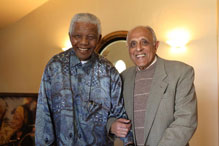
Nelson Mandela and Ahmed Kathrada at an event celebrating Kathrada’s birthday in August last year
February 9, 2010 – Twenty-five years ago, on February 10, 1985, Nelson Mandela announced to the world his rejection of then South African President PW Botha’s offer of conditional release.
His words were read out at a United Democratic Front rally at Soweto’s Jabulani Stadium, by his youngest daughter, Zindzi, in what became known as the “My father says” speech, and the “I am not prepared to sell the birthright of my people to be free” speech.
The rally had been arranged to celebrate the awarding of the Nobel Peace Prize to Archbishop Desmond Tutu. Zindzi had been given the message to read by her mother Winnie Mandela, who had visited Mr Mandela in Pollsmoor Prison. Mr Mandela was responding to Botha’s offer to release all political prisoners who renounced violence.
After an introduction, Zindzi started reading her father’s message to an electrified crowd by with the words: “My father says”.
His words detailed the history of the struggle against apartheid and explained why the African National Congress had been forced to adopt the armed struggle.
It ended with: “What freedom am I being offered while the organisation of the people remains banned? What freedom am I being offered when I may be arrested on a pass offence? What freedom am I being offered to live my life as a family with my dear wife, who remains in banishment in Brandfort? What freedom am I being offered when I must ask for permission to live in an urban area? What freedom am I being offered when I need a stamp in my pass to seek work? What freedom am I being offered when my very South African citizenship is not respected?
“Only free men can negotiate. Prisoners cannot enter into contracts. Herman Toivo ja Toivo, when freed, never gave any undertaking, nor was he called upon to do so.
“I cannot and will not give any undertaking at a time when I and you, the people, are not free.
“Your freedom and mine cannot be separated. I will return.”
Mr Mandela was unconditionally released five years and one day later.
Remembering the speech this week Zindzi said: “I was very proud that I had to do this for him – it was a great honour because he was not only my father, but my comrade.”
She added, “It was a very difficult thing for a child: wanting my father to come home, but at the same time understanding why he had to reject the offer.”
Mrs Mandela was under house arrest in the Free State town of Brandfort at the time, but had been given special permission to visit her husband in prison and collect his message. She was not allowed to attend the rally, but had permission from the Chief Magistrate of Brandfort to see her doctor in Johannesburg. She attended the rally in disguise.
Her daughter Zindzi recalled, “I wasn’t worried about us on stage, but I was nervous because mummy was in the crowd with a scarf on her head, cheap sunglasses, no make-up and looked like an ordinary aunty from the township, because she insisted on being there.”
Mr Mandela’s friend and comrade, Ahmed Kathrada, had been transferred from Robben Island to Pollsmoor Prison in 1982, with Mr Mandela, Walter Sisulu, Raymond Mhlaba, and Andrew Mlangeni at Pollsmoor Prison. He describes how Mandela’s response to Botha was crafted.
He said: “Madiba had been called to the office and [was] informed of this offer of Botha and then he was given, I think, a copy of Hansard [a verbatim report – with repetitions and redundancies omitted, and obvious mistakes corrected – of parliamentary proceedings]: a page or two of Hansard where Botha had made this offer. We then discussed it and it didn’t take long for us to unanimously reject the offer. We discussed it among the five of us and, of course, rejected it. And Madiba then, of course, drafted a reply, which we all agreed to. We all helped with the reply and then, of course, he drafted the speech that Zindzi read at a rally in Jabulani.”